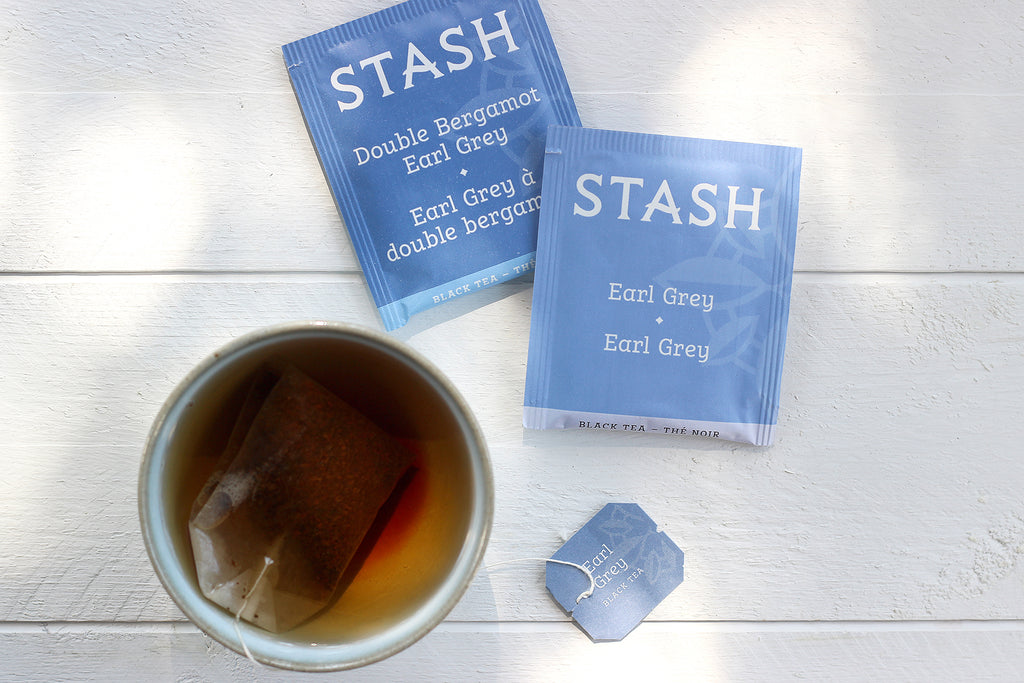Earl Grey is a perfect afternoon tea: bright, refreshing, and bold. To give our Earl Grey teas their uniquely bright flavor, we use only pure bergamot oil. We source straight from the sunlit orchards of Calabria, a region in Southern Italy known for producing the world’s most extraordinary bergamot fruit.
4 Common Questions about Bergamot Oil Used in Earl Grey Tea
What is bergamot?
Bergamot is a deliciously aromatic citrus fruit, likely a natural hybrid of a sour orange and a lemon or citron, with a sharp, intensely citrus flavor and a sour zing. The fruit is the size of an orange, yet similar in color to a lime. Bergamots are relatively juicy and low in seeds, but the most popular part of the fruit is the rind, or zest, which is bursting with aromatic oils.

What does bergamot taste like?
Bergamot is one of the only citrus fruits grown solely for its essential oil; the juice is not consumable due to its high acid content. Bergamot has a flesh that is so overpoweringly intense, bitter, and sour-tasting that most people deem it completely unpalatable.
However, when the extracted oil from the rind is blended with tea leaves, the result is a distinctive and highly aromatic citrusy floral aroma and taste that is bright, alluring and lingering. Although difficult for most tea drinkers to describe, the elusive aroma and captivating flavor of bergamot has made Earl Grey tea an international best seller.
How is bergamot oil sourced?
The origins of the bergamot tree are unknown, however it is only successfully grown in a few places in the world. Bergamot trees grow abundantly in Calabria, the extreme south of Italy, which occupies the toe of the country’s boot-shaped peninsula. Interestingly enough, the bergamot tree cannot grow in Sicily despite its proximity to the region where it thrives.
When in bloom, the bergamot—a small tree reaching four meters in height—is covered with a multitude of fragrant, white flowers. The fruit ripens between December and March, and the essential oil is cold-pressed from the rind of the ripe fruit. It is one of the more expensive citrus essential oils, but for good reason—it takes 200 kilograms of fruit to extract just one kilogram of bergamot essence!

How is bergamot used in Earl Grey tea?
The bergamot rind’s highly aromatic oil is combined with tea leaves to give Earl Grey its signature taste. There is something about the distinct flavor profile of bergamot that blends perfectly with a bold, full-bodied black tea. The scent of bergamot oil is similar to that of a sweet and light orange peel oil, with a floral note.
For the bergamot lover, Stash offers several teas flavored with pure bergamot oil:
Earl Grey
Our signature blend of curated black teas and pure, citrusy bergamot oil. This balanced, smooth drinking tea is the perfect combination of flavors to delight you any time of day. SHOP LOOSE LEAF | TEA BAG
Double Bergamot Earl Grey
For the Earl Grey lover who wants extra strong, bold bergamot flavor. An extra generous amount of lingering, citrusy bergamot blended with rich black teas for a bold, aromatic cup. SHOP LOOSE LEAF | TEA BAG
Breakfast in Paris
Sipping this unique blend will have you daydreaming of sitting outside a sunny Parisian café. Complex layers of rick black teas, fragrant lavender, citrusy bergamot, and a hint of creamy vanilla create an aromatic cup. SHOP LOOSE LEAF | TEA BAG
Decaf Earl Grey
By infusing bold, naturally decaffeinated black teas from around the world with the distinguished flavor of bergamot oil, we've crafted a perfectly balanced decaf option that's earned a loyal following. SHOP LOOSE LEAF | TEA BAG
Sourcing Stash
We travel around the world to visit the places where our tea ingredients are grown. Whether it's walking along tea bushes in India or peppermint fields in the Pacific Northwest, it is part of our sustainable sourcing program to feel confident in how our ingredients are produced.
We want to confirm with our own eyes that suppliers are following our Code of Conduct and that their practices match our values as a global citizen. This frequently means checking in on living conditions for workers, the cleanliness of processing facilities, making sure safety programs are in place for employees, and more.
It is also about relationship development. We want to know our suppliers personally, meet with farmers, and build close bonds. In working together, we are able to work more closely and better align our common interests.





